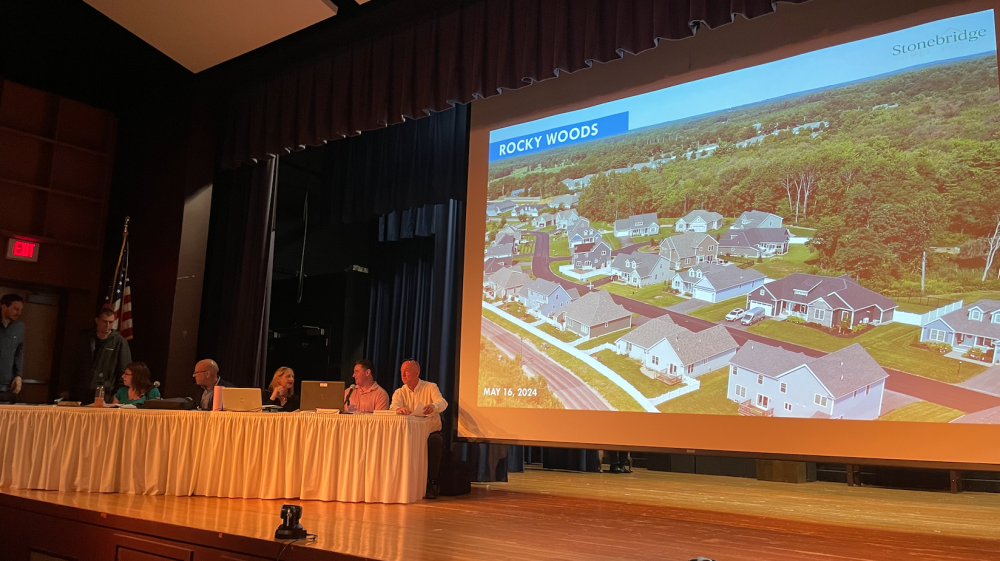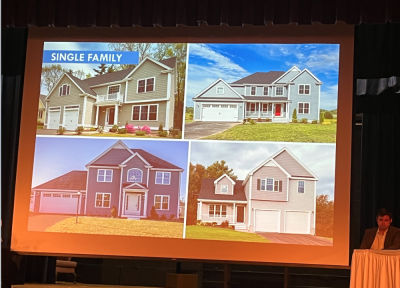Angry residents speak out against proposed Rocky Woods development
LAKEVILLE — A proposed 200-unit housing development off Freetown Street would worsen traffic, pose safety issues and create potential harm to the water supply, angry residents told the Zoning Board of Appeals Thursday at a public hearing.
Emotions ran high at times during the 3 ½ hour public hearing, with attendees filling much of the auditorium at Apponequet Regional High School. The meeting was moved there from the previous scheduled location at the public library to accommodate the number of people in attendance.
The meeting was the first public discussion of a proposal by Simonds Hill LCC to build 200 units, including 44 single-family homes, 46 duplex cottages catering to an older demographic and 11 10-unit condominium buildings on a site off Freetown Street. The developer is Muhammad Itani.
At least 50 of the units will be deemed affordable and restricted to people with low to moderate incomes.
Because of the affordable units components, the project falls under the regulations of Chapter 40B. That state mandate allows developers to bypass certain zoning requirements if less than 10 percent of the community’s housing stock is considered affordable. Lakeville’s current percentage of affordable housing stands at 5.75 percent.
“The state started the housing crisis,’’ resident Lawrence Konstant responded. “Why is it up to Lakeville to solve the issue?’’
Fire Chief Michael O’Brien said in submitted comments that the “most concerning’’ aspect of the project is the “lack of fire protection water’’ to accommodate the needs of the development. He suggested possibly adding a cistern to store water on the site.
In their comments, Planning Board members criticized the proposal, saying the “impact to the schools would be too great’’ and “destruction of natural resources’’ would result.
The density is “incompatible with the rural character of the town,’’ and goes against the overall goals for the town set by the master plan, Master Plan Implementation Committee Chair Rodney Dixon said.
Chris Plonka, Finance Committee chair, said the development would have a “negative impact’’ on the town budget. The tax revenue generated by projects such as this generally do not offset the demand on town services, such as police and fire departments, he said.
More residents will mean more need for public safety, he said. “The call volume is only going to go up,’’ he said.
Resident Kevin Donnelly noted that the water runoff from the site will eventually make its way into “the Great Cedar Swamp and every single well’’ in the neighborhood, a sentiment echoed by several other speakers.
The site is built on bedrock, resident Mary Liberatore said, which would result in blasting and drilling while the project is being built, which residents would have to live through.
“The people that live here, we count,’’ she said.
Having both the exit and entrance to the site on Freetown Street will add to already significant traffic on the site, residents said.
James Case said that trying to “walk, run or bike’’ on Freetown Street can be a “harrowing experience.’’ He urged the board to “fight for an egress’’ from an adjoining parcel on County Road that Itani owns.
Although residents urged the board to deny the project, Town Counsel Amy Kwesel warned that “outright denial is sometimes worse’’ than approving a plan with negotiated stipulations. If the town denies the project, the developers could appeal to the state, she said. If the state overturns the denial, she noted, the project could go forward with no stipulations at all.
In her experience she said most Chapter 40B developments are approved with stipulations that are negotiated between the developer and the town.
Zoning Board Chair John Olivieri said that the board will “do our best’’ to negotiate with the developers. “We will push as hard as we can,’’ he said.
Olivieri assured the audience that the board was listening to their concerns. Future meetings on the project will be dedicated to individual issues that have been raised, he said.
The next meeting on June 17 will focus on the traffic issues. The town has 180 days from the May 16 meeting to make a decision, Olivieri said, unless the developers agree to an extension.
















